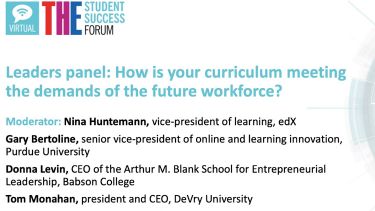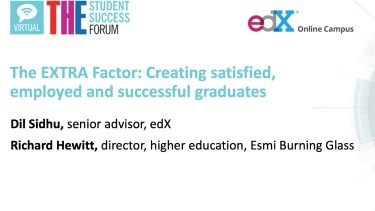At a time of unprecedented digital transformation, universities face a challenge to remain relevant
Harnessing technology, embedding diverse forms of content and placing greater focus on the learner can help universities succeed in the digital age.
An open forum at the THE Emerging Economies Summit, held in partnership with online learning platform edX, asked whether digitalisation will disrupt international brain drain.
John Schwartz, head of business development at edX, said that the rapid transformation in higher education, accelerated by the pandemic, could be seen as a challenge or an opportunity.
“In less than three weeks, the entire world flipped a switch and went online,” Schwartz said. “Now we need to think about how we beef up our online programmes. What are the resources we have to allocate? What kind of time do professors have to allocate? What kind of money are we going to need to throw at this?”
Schwartz argued there were three key pillars universities should adopt to navigate the digital world and help prepare graduates for the jobs of the future: technology, content and learner centricity.
With students seeking flexible learning and stackable, skills-based content, Schwartz said institutions would need to develop student-centric thinking.
“The learner ecosystem has changed. Everybody agrees. Blended – it’s here to stay. We’re not going back to the old traditional model,” he said.
“We’re dealing with very different learners than five years ago, than even two years ago. There is tonnes of accessibility, tremendous numbers of platforms, full access, and learners are going to take advantage of that. Not because it’s accessible, they’re going to take advantage of it because they need to ensure that they’re going to be employable.”
Universities should enhance their learning offering by tapping into existing technology solutions to ensure graduates have the skill set needed to find employment, Schwartz said.
“Technology is changing skills and we don’t know what those skills are going to be in five years,” he said.
“But there are many ways to prepare and buttress whatever curriculum, whichever system you’re currently using.”
The sharing economy is now part of higher education, Schwartz said, and universities had the opportunity to tap into online content to add more learning specialisations and in-demand subjects. EdX, for example, offers more than 3,000 courses from institutions including Harvard and MIT and companies including IBM and Google. Universities can embed these courses into their curricula.
“We’re going to give you the highest-quality content that exists in the world, in a format that’s designed for the learner to be able to use that content in a meaningful, workable way,” Schwartz said. “But you choose how you support that learning and the tools you give your students. It’s the perfect package.”
The panel:
- John Schwartz, head of business development at edX
- Tim Sowula, head of content and engagement at THE (chair)
Watch the session on demand above or on the THE Connect YouTube channel.
Find out more about edX.










